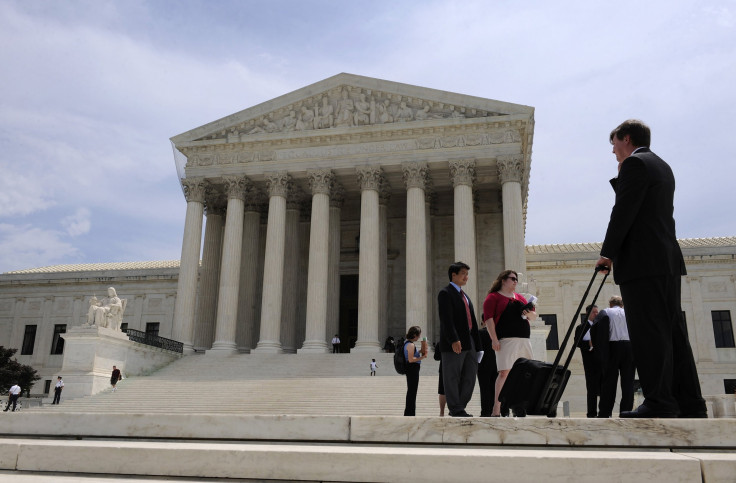Aereo Supreme Court Case: Retransmission Fees At The Heart Of Legal Battle With CBS, NBC, ABC, Fox
Aereo lets subscribers watch TV over the Internet; the Big Four networks don’t like it.

The U.S. Supreme Court on Tuesday heard arguments in a case that could radically transform the way Americans watch broadcast television. If you haven’t been paying attention to the debate until now, you may soon have no choice.
The battle is between the major broadcast networks (ABC, CBS, NBC and Fox) and Aereo Inc., a two-year-old startup based in Long Island City, N.Y., and backed by Barry Diller’s IAC/InterActiveCorp (NASDAQ:IACI). Aereo, its supporters say, is a kind of godsend for cable cord cutters. It’s a hassle-free subscription-based service that allows users to watch live broadcast television on their computers or mobile devices. The service costs about $8 a month and doesn’t require a cable subscription.
Unsurprisingly, the Big Four networks don’t like it. They say it amounts to copyright theft, and they sued to have Aereo shut down. While the legal case hinges on a dizzying array of technical semantics, what’s at stake is really quite simple: Is Aereo stealing the broadcasters’ copyrighted content, or is it merely giving its users access to free public airwaves?
First, a little history: Since the dawn of the broadcasting era, public airwaves have been free for consumers to access broadcast programming, and up until the 1980s, most American households received their TV channels through personal antennas, those old-fashioned rabbit ears your grandfather used to spend hours adjusting until the picture cleared up. But with the advent of cable television, viewers began getting their broadcast networks delivered to them through their cable providers. Because those signals aren’t accessed live from an antenna, they’re considered retransmissions, or a form of “public performance,” that are subject to licensing fees by their copyright owners.
Fast-forward 30 years, and retransmission fees have become an incredibly lucrative, even indispensable revenue stream for broadcast networks. As advertising revenue has suffered in the wake of competition from cable and increased DVR viewing, retransmission fees have skyrocketed. According to a report from the financial research firm SNL Kagan, broadcast fees are expected to rise 10 percent to 12 percent each year for the next three years, reaching $6.6 billion by 2017. You might recall last year’s protracted battle between CBS Corp. (NYSE:CBS) and Time Warner Cable Inc. (NYSE:TWC), which resulted in a month-long blackout of the Eye Network. That fight was over -- you guessed it -- retransmission fees.
And, ultimately, so is the broadcasters’ fight with Aereo. If the startup had agreed to pay retransmission fees to the broadcasters, the Supreme Court case wouldn’t be happening (and Aereo might not exist at all, assuming the fees would be cost-prohibitive), but Aereo maintains that it's not “retransmitting” signals but instead merely pulling them out of the airwaves. The service uses tiny antennas to capture broadcast signals and stream them to its subscribers. If cable’s retransmission of a broadcast signal is tantamount to a public performance, Aereo argues that its service is a private one, because each of its antennas delivers a signal to only one household at a time. So, in a sense, to the user, Aereo acts as a remote set of rabbit ears.
However, the networks say Aereo’s inventors have purposely engineered the service to act as a copyright-law workaround. They compare Aereo to a Rube Goldberg machine, an overly elaborate contraption that performs a simple task. “Merely enabling TV programs to appear on the screens of mobile devices does not represent much of a technological breakthrough on Aereo's part,” Fortune pointed out on Monday. “Aereo's breakthrough is different. Its technology purports to overcome legal obstacles, not engineering ones.”
But Kyle Alspach, a writer for the Boston Globe’s BetaBoston website, argued that the broadcasters are essentially cannibalizing their own futures. With more viewers -- particularly young ones -- watching television exclusively through the Internet, services like Aereo could be the last bastion of live television viewing, and thus the last bastion of television commercials. Rather than see Aereo as a threat, Alspach argues, the networks would be better off seeing it as an opportunity to expand the reach of their ads, which most people these days fast-forward through via DVRs. “If the television viewer of the future is anything like me, then broadcasters are making a mistake in thinking streaming service Aereo is the enemy,” Alspach wrote.
It’s a fair point, but if the history of media can serve as a guide, we can expect those companies that benefit from the status quo to keep on doing what they can to preserve it, innovation be damned.
To follow the Supreme Court Case, American Broadcasting Companies, Inc. v. Aereo, Inc., visit the live blog here.
Got a news tip? Email me. Follow me on Twitter @christopherzara.
© Copyright IBTimes 2024. All rights reserved.






















